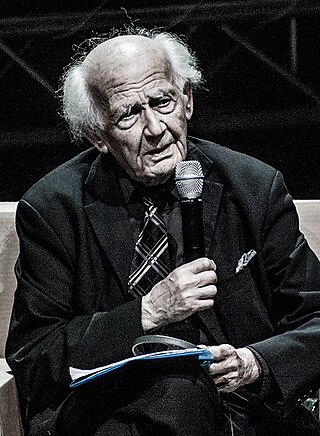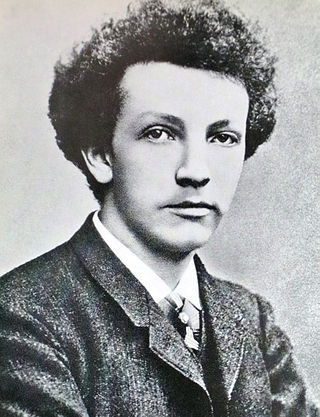
Niccolò di Bernardo dei Machiavelli was an Italian diplomat, author, philosopher and historian who lived during the Renaissance. He is best known for his political treatise The Prince, written around 1513 but not published until 1532, five years after his death. He has often been called the father of modern political philosophy and political science.
Postmodernism is an intellectual stance or mode of discourse characterized by skepticism toward the "grand narratives" of modernism; rejection of epistemic (scientific) certainty or the stability of meaning; and sensitivity to the role of ideology in maintaining political power. Claims to objectivity are dismissed as naïve realism, with attention drawn to the conditional nature of knowledge claims within particular historical, political, and cultural discourses. The postmodern outlook is characterized by self-referentiality, epistemological relativism, moral relativism, pluralism, irony, irreverence, and eclecticism; it rejects the "universal validity" of binary oppositions, stable identity, hierarchy, and categorization.
Postmodern music is music in the art music tradition produced in the postmodern era. It also describes any music that follows aesthetical and philosophical trends of postmodernism. As an aesthetic movement it was formed partly in reaction to modernism but is not primarily defined as oppositional to modernist music. Postmodernists question the tight definitions and categories of academic disciplines, which they regard simply as the remnants of modernity.

In the arts and in literature, the term avant-garde identifies a genre of art, an experimental work of art, and the experimental artist who created the work of art, which usually is aesthetically innovative, whilst initially being ideologically unacceptable to the artistic establishment of the time. The military metaphor of an advance guard identifies the artists and writers whose innovations in style, form, and subject-matter challenge the artistic and aesthetic validity of the established forms of art and the literary traditions of their time; thus how the artists who created the anti-novel and Surrealism were ahead of their times.
Postmodernity is the economic or cultural state or condition of society which is said to exist after modernity. Some schools of thought hold that modernity ended in the late 20th century – in the 1980s or early 1990s – and that it was replaced by postmodernity, and still others would extend modernity to cover the developments denoted by postmodernity. The idea of the postmodern condition is sometimes characterized as a culture stripped of its capacity to function in any linear or autonomous state like regressive isolationism, as opposed to the progressive mind state of modernism.

Ulrich Beck was a German sociologist, and one of the most cited social scientists in the world during his lifetime. His work focused on questions of uncontrollability, ignorance and uncertainty in the modern age, and he coined the terms "risk society" and "second modernity" or "reflexive modernization". He also tried to overturn national perspectives that predominated in sociological investigations with a cosmopolitanism that acknowledges the interconnectedness of the modern world. He was a professor at the University of Munich and also held appointments at the Fondation Maison des Sciences de l’Homme (FMSH) in Paris, and at the London School of Economics.
Social theories are analytical frameworks, or paradigms, that are used to study and interpret social phenomena. A tool used by social scientists, social theories relate to historical debates over the validity and reliability of different methodologies, the primacy of either structure or agency, as well as the relationship between contingency and necessity. Social theory in an informal nature, or authorship based outside of academic social and political science, may be referred to as "social criticism" or "social commentary", or "cultural criticism" and may be associated both with formal cultural and literary scholarship, as well as other non-academic or journalistic forms of writing.
20th-century classical music is art music that was written between the years 1901 and 2000, inclusive. Musical style diverged during the 20th century as it never had previously, so this century was without a dominant style. Modernism, impressionism, and post-romanticism can all be traced to the decades before the turn of the 20th century, but can be included because they evolved beyond the musical boundaries of the 19th-century styles that were part of the earlier common practice period. Neoclassicism and expressionism came mostly after 1900. Minimalism started much later in the century and can be seen as a change from the modern to postmodern era, although some date postmodernism from as early as about 1930. Aleatory, atonality, serialism, musique concrète, electronic music, and concept music were all developed during the century. Jazz and ethnic folk music became important influences on many composers during this century.

Anthony Giddens, Baron Giddens is an English sociologist who is known for his theory of structuration and his holistic view of modern societies. He is considered to be one of the most prominent modern sociologists and is the author of at least 34 books, published in at least 29 languages, issuing on average more than one book every year. In 2007, Giddens was listed as the fifth most-referenced author of books in the humanities. He has academic appointments in approximately twenty different universities throughout the world and has received numerous honorary degrees.

Zygmunt Bauman was a Polish-born sociologist and philosopher. He was driven out of the Polish People's Republic during the 1968 Polish political crisis and forced to give up his Polish citizenship. He emigrated to Israel; three years later he moved to the United Kingdom. He resided in England from 1971, where he studied at the London School of Economics and became Professor of Sociology at the University of Leeds, later Emeritus. Bauman was a social theorist, writing on issues as diverse as modernity and the Holocaust, postmodern consumerism and liquid modernity.

In music, modernism is an aesthetic stance underlying the period of change and development in musical language that occurred around the turn of the 20th century, a period of diverse reactions in challenging and reinterpreting older categories of music, innovations that led to new ways of organizing and approaching harmonic, melodic, sonic, and rhythmic aspects of music, and changes in aesthetic worldviews in close relation to the larger identifiable period of modernism in the arts of the time. The operative word most associated with it is "innovation". Its leading feature is a "linguistic plurality", which is to say that no one music genre ever assumed a dominant position.
Inherent within musical modernism is the conviction that music is not a static phenomenon defined by timeless truths and classical principles, but rather something which is intrinsically historical and developmental. While belief in musical progress or in the principle of innovation is not new or unique to modernism, such values are particularly important within modernist aesthetic stances.
The concept of reflexive modernization or reflexive modernity was launched by a joint effort of three of the leading European sociologists: Anthony Giddens, Ulrich Beck and Scott Lash. The introduction of this concept served a double purpose: to reassess sociology as a science of the present, and to provide a counterbalance to the postmodernist paradigm offering a re-constructive view alongside deconstruction.
Second modernity is a phrase coined by the German sociologist Ulrich Beck, and is his word for the period after modernity.
Late modernity is the characterization of today's highly developed global societies as the continuation of modernity rather than as an element of the succeeding era known as postmodernity, or the postmodern. Introduced as "liquid" modernity by the Polish sociologist Zygmunt Bauman, late modernity is marked by the global capitalist economies with their increasing privatization of services and by the information revolution. Among its characteristics is that some traits, which in previous generations were assigned to individuals by the community, are instead self-assigned individually and can be changed at will. As a result, people feel insecure about their identities and their places in society, and they feel anxious and distrustful about whether their self-proclaimed traits are being respected. Society as a whole feels more chaotic.
In social science, disenchantment is the cultural rationalization and devaluation of religion apparent in modern society. The term was borrowed from Friedrich Schiller by Max Weber to describe the character of a modernized, bureaucratic, secularized Western society. In Western society, according to Weber, scientific understanding is more highly valued than belief, and processes are oriented toward rational goals, as opposed to traditional society, in which "the world remains a great enchanted garden".
The following events related to sociology occurred in the 1990s.
Stephen K. White, is James Hart Professor of Politics at the University of Virginia. His research focuses on critical social and political theory, philosophy of social science, and continental political thought. He has contributed to several scholarly works on Jürgen Habermas, including The Cambridge Companion to Habermas, which he edited. He is also a past editor of the journal Political Theory.
Peter Beilharz is an Australian sociologist. He is professor of critical theory at Sichuan University, Chengdu, PRC. Previously he was professor of sociology and remains Emeritus Professor at La Trobe University, Melbourne. He is adjunct professor at Curtin University, Perth, Western Australia. Beilharz is founding editor of the international journal of social theory Thesis Eleven published by Sage.
Postmodern religion is any type of religion that is influenced by postmodernism and postmodern philosophies. Examples of religions that may be interpreted using postmodern philosophy include Postmodern Christianity, Postmodern Neopaganism, and Postmodern Buddhism. Postmodern religion is not an attempt to banish religion from the public sphere; rather, it is a philosophical approach to religion that critically considers orthodox assumptions. Postmodern religious systems of thought view realities as plural, subjective, and dependent on the individual's worldview. Postmodern interpretations of religion acknowledge and value a multiplicity of diverse interpretations of truth, being, and ways of seeing. There is a rejection of sharp distinctions and global or dominant metanarratives in postmodern religion, and this reflects one of the core principles of postmodern philosophy. A postmodern interpretation of religion emphasises the key point that religious truth is highly individualistic, subjective, and resides within the individual.
Patrick Curry is a Canadian-born British scholar who has worked and taught on a variety of subjects from cultural astronomy to divination, the ecology movement, and the nature of enchantment. He is known for his studies of J. R. R. Tolkien.





